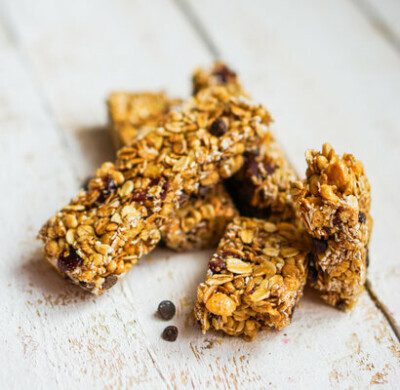Origin
Snack bars most likely originated in the US. The invention of granola bars is disputed between two US inventors. However, the invention is mostly credited to MIT’s inventor Stanley Mason.2
The expansion of this baked product category is attributed to its perceived health benefits in comparison with traditional highly caloric snacks such as cookies, chips, and popcorn.
Ingredients
Snack bars are made with a variety of ingredients including:1
| Ingredient | Type | Function |
|---|---|---|
| Cereal Grains | Oats, rice, corn, among others. |
|
| Nuts | Walnuts, almonds, nuts, pecans, etc |
|
| Protein Powders | Soy protein powder, whey powder |
|
| Sweeteners | Liquid sweeteners or honey |
|
| Fats | Coconut oil, vegetable shortening |
|
| Dried fruits | Cherries, raisins, etc |
|
Nutrition
Typical nutritional value of commercially available snack bars per 100 grams serving:1
| Component | Breakfast Bar | Multigrain Bar | Protein Performance Bar |
|---|---|---|---|
| Carbohydrate | 66.7 | 55.1 | 53 |
| Protein | 9.8 | 18.5 | 25.0 |
| Lipids | 17.6 | 13.2 | 10.0 |
| Moisture | 4.1 | 8.0 | 9.0 |
| Ash | 1.8 | 3.1 | 3.0 |
The most commonly perceived benefits of snack bars are their high fiber content, antioxidant components, vitamins and minerals, and high-quality protein content.
Commercial production
Snack bars are commercially produced through the following process:1
- Dry ingredients mixing: cereals such as oats and nuts are mixed together.
- Wet ingredients mixing: honey, coconut oil, or liquid sweetener are mixed separately.
- Mixing: dried and wet ingredients are mixed to form a uniform dough.
- Moulding: the mixture is placed in the desired mould.
- Baking: various temperature-time combinations are used depending on the composition and final product desired characteristics.
- Cooling: snack bars are left to cool down to room temperature.
- Packaging
Application
Snack bars are a good alternative snack for health-conscious consumers who prefer highly nutritious food products with acceptable organoleptic characteristics.
A wide variety of snack bars can be produced depending on the consumer’s wants and needs. Following are some of the most popular snack bar formulations:1
| Snack Bars | Processing conditions |
|---|---|
| Fruit-based | Baked at 130 oC (266 oF) for 15 min |
| Wheat or soy-based | Baked at 85 oC (185 oF) for 4 min |
| Fruit-based and vegetable-based | Baked at 160 oC (320oF) for 10 min |
| Vegetable-based | Baked at 120 oC (248oF) for 30 min |
References
- Constantin, O.E, and Istrati, D.I . “Functional properties of snack bars.” Functional Foods. IntechOpen, 2018.
- ”Happy National Granola Bar Day | The Whole Grains Council.” Wholegrainscouncil.Org, 2021, https://wholegrainscouncil.org/blog/2010/01/happy-national-granola-bar-day. Accessed 19 December 2021.
- Food and Drug Administration (FDA). US Department of Health and Human Services. CFR Code of Federal Regulations Title 21, Part 101 Food Labeling, https://www.accessdata.fda.gov/scripts/cdrh/cfdocs/cfcfr/CFRSearch.cfm?fr=101.76 , Accessed 19 December 2021.
- European Commission (EC). Commission Regulation (EU) No 1924/2006 of the European Parliament and of the Council of 20 December 2006 on nutrition and health claims made on foods. Official Journal Of European Communities, 20 December 2006. Accessed 19 December 2021.

